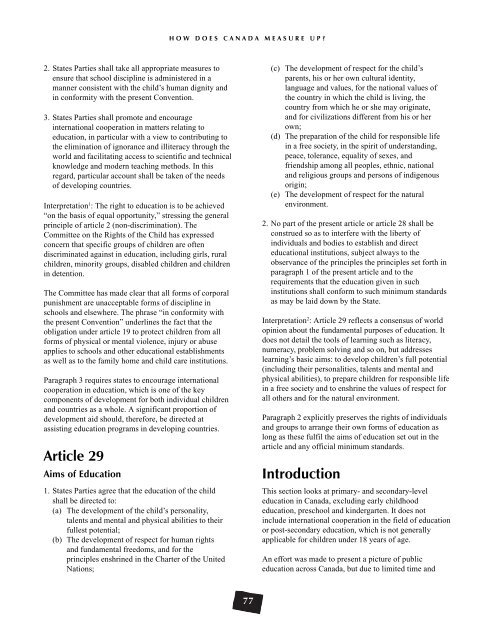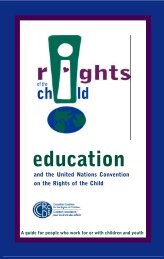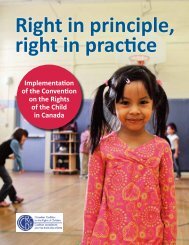Poste - Canadian Coalition for the Rights of Children
Poste - Canadian Coalition for the Rights of Children
Poste - Canadian Coalition for the Rights of Children
You also want an ePaper? Increase the reach of your titles
YUMPU automatically turns print PDFs into web optimized ePapers that Google loves.
2. States Parties shall take all appropriate measures to<br />
ensure that school discipline is administered in a<br />
manner consistent with <strong>the</strong> child’s human dignity and<br />
in con<strong>for</strong>mity with <strong>the</strong> present Convention.<br />
3. States Parties shall promote and encourage<br />
international cooperation in matters relating to<br />
education, in particular with a view to contributing to<br />
<strong>the</strong> elimination <strong>of</strong> ignorance and illiteracy through <strong>the</strong><br />
world and facilitating access to scientific and technical<br />
knowledge and modern teaching methods. In this<br />
regard, particular account shall be taken <strong>of</strong> <strong>the</strong> needs<br />
<strong>of</strong> developing countries.<br />
Interpretation 1 : The right to education is to be achieved<br />
“on <strong>the</strong> basis <strong>of</strong> equal opportunity,” stressing <strong>the</strong> general<br />
principle <strong>of</strong> article 2 (non-discrimination). The<br />
Committee on <strong>the</strong> <strong>Rights</strong> <strong>of</strong> <strong>the</strong> Child has expressed<br />
concern that specific groups <strong>of</strong> children are <strong>of</strong>ten<br />
discriminated against in education, including girls, rural<br />
children, minority groups, disabled children and children<br />
in detention.<br />
The Committee has made clear that all <strong>for</strong>ms <strong>of</strong> corporal<br />
punishment are unacceptable <strong>for</strong>ms <strong>of</strong> discipline in<br />
schools and elsewhere. The phrase “in con<strong>for</strong>mity with<br />
<strong>the</strong> present Convention” underlines <strong>the</strong> fact that <strong>the</strong><br />
obligation under article 19 to protect children from all<br />
<strong>for</strong>ms <strong>of</strong> physical or mental violence, injury or abuse<br />
applies to schools and o<strong>the</strong>r educational establishments<br />
as well as to <strong>the</strong> family home and child care institutions.<br />
Paragraph 3 requires states to encourage international<br />
cooperation in education, which is one <strong>of</strong> <strong>the</strong> key<br />
components <strong>of</strong> development <strong>for</strong> both individual children<br />
and countries as a whole. A significant proportion <strong>of</strong><br />
development aid should, <strong>the</strong>re<strong>for</strong>e, be directed at<br />
assisting education programs in developing countries.<br />
Article 29<br />
Aims <strong>of</strong> Education<br />
1. States Parties agree that <strong>the</strong> education <strong>of</strong> <strong>the</strong> child<br />
shall be directed to:<br />
(a) The development <strong>of</strong> <strong>the</strong> child’s personality,<br />
talents and mental and physical abilities to <strong>the</strong>ir<br />
fullest potential;<br />
(b) The development <strong>of</strong> respect <strong>for</strong> human rights<br />
and fundamental freedoms, and <strong>for</strong> <strong>the</strong><br />
principles enshrined in <strong>the</strong> Charter <strong>of</strong> <strong>the</strong> United<br />
Nations;<br />
H O W D O E S C A N A D A M E A S U R E U P ?<br />
77<br />
(c) The development <strong>of</strong> respect <strong>for</strong> <strong>the</strong> child’s<br />
parents, his or her own cultural identity,<br />
language and values, <strong>for</strong> <strong>the</strong> national values <strong>of</strong><br />
<strong>the</strong> country in which <strong>the</strong> child is living, <strong>the</strong><br />
country from which he or she may originate,<br />
and <strong>for</strong> civilizations different from his or her<br />
own;<br />
(d) The preparation <strong>of</strong> <strong>the</strong> child <strong>for</strong> responsible life<br />
in a free society, in <strong>the</strong> spirit <strong>of</strong> understanding,<br />
peace, tolerance, equality <strong>of</strong> sexes, and<br />
friendship among all peoples, ethnic, national<br />
and religious groups and persons <strong>of</strong> indigenous<br />
origin;<br />
(e) The development <strong>of</strong> respect <strong>for</strong> <strong>the</strong> natural<br />
environment.<br />
2. No part <strong>of</strong> <strong>the</strong> present article or article 28 shall be<br />
construed so as to interfere with <strong>the</strong> liberty <strong>of</strong><br />
individuals and bodies to establish and direct<br />
educational institutions, subject always to <strong>the</strong><br />
observance <strong>of</strong> <strong>the</strong> principles <strong>the</strong> principles set <strong>for</strong>th in<br />
paragraph 1 <strong>of</strong> <strong>the</strong> present article and to <strong>the</strong><br />
requirements that <strong>the</strong> education given in such<br />
institutions shall con<strong>for</strong>m to such minimum standards<br />
as may be laid down by <strong>the</strong> State.<br />
Interpretation 2 : Article 29 reflects a consensus <strong>of</strong> world<br />
opinion about <strong>the</strong> fundamental purposes <strong>of</strong> education. It<br />
does not detail <strong>the</strong> tools <strong>of</strong> learning such as literacy,<br />
numeracy, problem solving and so on, but addresses<br />
learning’s basic aims: to develop children’s full potential<br />
(including <strong>the</strong>ir personalities, talents and mental and<br />
physical abilities), to prepare children <strong>for</strong> responsible life<br />
in a free society and to enshrine <strong>the</strong> values <strong>of</strong> respect <strong>for</strong><br />
all o<strong>the</strong>rs and <strong>for</strong> <strong>the</strong> natural environment.<br />
Paragraph 2 explicitly preserves <strong>the</strong> rights <strong>of</strong> individuals<br />
and groups to arrange <strong>the</strong>ir own <strong>for</strong>ms <strong>of</strong> education as<br />
long as <strong>the</strong>se fulfil <strong>the</strong> aims <strong>of</strong> education set out in <strong>the</strong><br />
article and any <strong>of</strong>ficial minimum standards.<br />
Introduction<br />
This section looks at primary- and secondary-level<br />
education in Canada, excluding early childhood<br />
education, preschool and kindergarten. It does not<br />
include international cooperation in <strong>the</strong> field <strong>of</strong> education<br />
or post-secondary education, which is not generally<br />
applicable <strong>for</strong> children under 18 years <strong>of</strong> age.<br />
An ef<strong>for</strong>t was made to present a picture <strong>of</strong> public<br />
education across Canada, but due to limited time and




